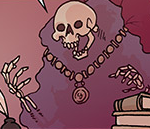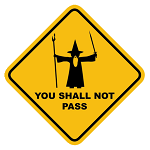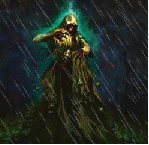|
Tuxedo Catfish posted:That's incredibly boring. Some things are just destined to happen. So great, you killed one dude 60 years ago. Bad guy is still there, just has a different true name, so I hope you weren't hoping on still using that. Or somehow, the bad guy was resurrected. Or the ghost of the grandfather has been waiting for this day to come and becomes the bad guy. Maybe it was a really important bad guy, so now you've got some more powerful Seers who notice the disturbance of the past and fill the role or the world has become a lovely place in the interim a la Back to the Future 2. Or a Banisher from 60 years ago follows the temporal sympathy to the potential future and comes to hunt the mages down. Story solutions that doesn't discount what the player did, but does keep the story moving. It really isn't that difficult, and once the players realize that it's not an "I WIN!!!" button, then maybe you can get back to the story you're all playing. I get that it's something that exists, but taking that away from anyone with Time is definitely boring.
|
|
|
|

|
| # ? May 13, 2024 07:36 |
|
Time was just fine in 1e when you could only go back and alter the past with archmastery, I really doubt that 2e changed so much that now Time absolutely must gently caress with the past to be useful. You'll just have to make do with altering the flow of time, seeing the future as it might currently play out, putting things in stasis, and literally every other thing related to Time that isn't making GBS threads all over the game itself.
|
|
|
|
How many dots do you need to stop time?
|
|
|
|
Kavak posted:How many dots do you need to stop time? Five dots gets you Temporal Pocket, which stops time but you can't do anything to anything besides yourself while it's frozen.
|
|
|
|
Yawgmoth posted:Time was just fine in 1e when you could only go back and alter the past with archmastery, I really doubt that 2e changed so much that now Time absolutely must gently caress with the past to be useful. You'll just have to make do with altering the flow of time, seeing the future as it might currently play out, putting things in stasis, and literally every other thing related to Time that isn't making GBS threads all over the game itself. You need 4 dots and at least +2 reach to really start doing major things to other mages, or just 4 dots to start really changing sleeper's pasts. Shifting Sands can back you up an entire scene with +1 reach, but that's incredibly susceptible to dispellation because it's a visible rift in time that stays until the mage who cast shifting sands catches back up. So it really isn't world ending at an early stage.
|
|
|
|
Tuxedo Catfish posted:That's incredibly boring. Time should be able to alter the future by changing the past but in limited and messy ways that don't actually have gigantic ripple effects unless you spend the same amount of resources (spell factors, mana, whatever) that you would to use Forces to level a gigantic area or Mind to wipe the memories of an entire neighborhood or something. So if I try to destroy you by killing your grandfather but don't do enough damage to manage it (you had more stamina than I expected or something), what's seen to happen is I point at you imperiously and everything flickers and goes staticky for a second and suddenly large swathes of your body are fading to translucence, Michael J. Fox style. You suddenly remember your parents telling you stories about the strange man who came at your grandfather with a knife one day but was stopped by the police in time/inflicted a flesh wound but was stopped by the police in time/killed your grandfather(???). Very little else in the world, indeed in your own personal history, has changed, although as of now and going forward into the future people's memories of you and your family history might be strange and confusing and they might start asking themselves how it is that they've been employing you or dating you or whatever when all this time you've been dead or suffering from some kind of childhood injury or something, they can't really explain it. What "actually" happens is not that someone goes back in time to kill your grandfather and the entirety of history is replayed such that this is what happens all along, but magic has been used to rewrite a single event in the (inert, inactive) past and then summon the logical consequences of that event forward into the present and inflict them on a single person, specifically you. If you don't survive my attack, then a Time mage who looks back into your grandfather's history will find that he was killed by an unknown assailant in 19XX, which is really weird because a lot of future events and relationships unfold exactly as they would have if someone just like your grandfather was there, but, well, there's plenty of weird stuff in the world. Ferrinus fucked around with this message at 05:20 on Dec 16, 2016 |
|
|
|
The way you describe it sounds about as boring as the other thing. Why even bother if the measure amounts to a muffled fart in spacetime
|
|
|
|
Basic Chunnel posted:The way you describe it sounds about as boring as the other thing. Why even bother if the measure amounts to a muffled fart in spacetime Because it doesn't require separate scenes or sessions to resolve, doesn't outright erase what might have been hours of play by other IRL people, and has about the same pound for pound, action for action impact as the other Arcana.
|
|
|
|
Ferrinus posted:You can gently caress around in the spirit world all you want but that won't make your enemy suddenly stop existing or get retconned into your lifelong ally on its own. At some stage of the game some kind of concrete event will have to take place that other characters can react to and resist on their own terms if they're at all initiated into the supernatural - a spirit has to actually materialize and try to bite someone's face off, or win a contested roll to use its influences to alter someone's mood, or something. Maybe, but can't you just retcon your enemy's mind into being your lifelong ally with sufficient Mind and without having to deal with temporal sympathy? Also, Spirit can certainly make your enemies stop existing, if by 'existing' you mean 'breathing'. 
|
|
|
|
Are all mage powers a feast or famine thing I'll just be over here hacking the source code of reality to get someone to say "Polo" when I say Marco while you suckers figure it out
|
|
|
|
Cabbit posted:Maybe, but can't you just retcon your enemy's mind into being your lifelong ally with sufficient Mind and without having to deal with temporal sympathy? Yes, but that means you have to be in the same room with them and generate Potency in excess of their Resolve or whatever. You're still using the (extremely generous to you, if the victim is not themselves a mage) resolution mechanics.
|
|
|
|
Basic Chunnel posted:Are all mage powers a feast or famine thing No. There's actually a good breadth of things you can do with magic strait from the book from the subtle magic like you're whispering to the moment when you're on a rooftop screaming "I am a golden god!" at the top of your lungs sort of magic.
|
|
|
|
Tuxedo Catfish posted:Are "alternate timelines" a thing in the Mage cosmology? This is going to be long but: Yes to alternate timelines being in mage. No to them just being mage or abyss exclusive. There's entire alternate realities that get mentioned in various books inside and outside of Mage. The biggest alternate reality is probably the Prince of 100,000 Leaves. It's pretty much one of the Big Bad's for the setting itself. It's an Abyssal intruder that wants to make (and possibly already has created a separate reality or even actually may be the original time line where the Exarch's hosed up and let in the Abyss) a reality where a bunch of eldritch abominations conquered earth and rejiggered it to their liking. The world it wants to make reads like Malfeas from Exalted went ape poo poo on the modern world. The summary from the Wiki posted:The Prince was first contacted (or created via an unthinkable disastrous Time paradox) three thousand years ago in Egypt by a coven of cannibal priests. It was ejected into the Abyss soon enough, but knowledge of his intrusion remained and was harnessed by the Ebon Noose cabal via the Mastigos member known as the Lernaean. The Prince used the offered soul to reach into the phenomenal reality and manifested himself. The cabal was soon destroyed, but the Prince has still one lackey, the Medusan, who works to make his master reality. Settling near Salem, the Medusan has built the Cult of the Red Word that worships the Prince as events yet to come. TL;DR: It's basically an invading alternate reality that's so fundamentally vile that reality itself took one look at it and said "gently caress this. This is just too messed up for me!" before interceding and chucking it into the abyssal waste bin. It's basically a walking talking advertisement for why time magic is ridiculously dangerous. Aside from that it's mentioned in the God Machine related books that the God Machine created a few alternate realities as part of some experiment it was doing. This lead to Seattle being a nest of fallen and it's basically been left flailing on how to fix that particular mess and shut them down. It was vaguely implied in 1e that one of the ways arch mages and similar entities can do their thing is that they actually just shift into the timeline they want instead of just breaking reality over their knee. See Abyssal related stuff like the Prince of 100,000 Leaves and the possible implications of the 1e Atlantis origin story as examples of that. They're all over the place, really. One of the Hunter books has a really disturbing in character perspective of a bunch of tier 1 hunters who try to be heroes and get sucked into an alternate reality that reads like something Lovecraft might write. Way back when it came out I remember reading a thread on another forum suggesting that it might either be the leadership of the Cheiron Group's home reality, something to do with the Prince, or something to do with some blurb from the Shadows of the UK book that I can't recall offhand. Archonex fucked around with this message at 06:55 on Dec 16, 2016 |
|
|
|
Stuff like the Prince is why I love the Abyss. Opening a rift into reality that a fly-monster or a demon steps out is alright I guess but a living, sapient timeline or a mathematical equation based on principles of unreality is the real poo poo. White Wolf is basically married to the idea that there must always be a faction that wants to destroy the world Just Because and that's lame but the Abyss is easily the best one of those.
|
|
|
|
I made you all a visual depiction of Magechat. I HATE TIME TRAVEL etc
|
|
|
|
That is the perfect representation of Magechat.
|
|
|
|
I was going to come in just to chime in about how much I hate time travel, but after that it would just be redundant. So perfect.
|
|
|
|
I'm a fan of the Bill & Ted method of handling in-scene time travel. Which is to say when finding yourself in an unexpected situation, cast your spell and announce what preparations you are going to make for this situation and they just appear and the scene continues as normal.
|
|
|
|
That's how I set up high-level precognition spells.
|
|
|
|
This time thread is really helping me figure out how I am going to deal with the inevitable 3 dots in Time conundrum in my current WoD meets Harry Potter campaign (all five players are teens in a school for young mages). I think the first time someone gets to the level, I will dedicate a whole session to Groundhog's Day shenanigans, replaying the same scenes over and over to avoid a looming disaster, then for the next session insist that Shifting Sands just calls for the player to describe what they changed, and otherwise not replay anything. So far my Acanthus player hasn't really made much use of her powers (I was so happy she used postcognition the other day!) But the Mastigos is powering up Time to 2 dots next session, and he is *very* creative with his Space, so I foresee a lot of fun with mild headaches from him in the future. Does anyone have interesting Spirit-related adventures? The Thyrsus in the group is very creative and enthusiastic and pouring her emphasis into Spirit, with great hopes for adventures in that vein. I never played Werewolf and am still figuring out the whole spirit world issues, basically on the back of DaveB's spirit world descriptions in Broken Diamond, and, of course, Princess Mononoke and Spirited Away. However, DaveB has never had a Thyrsus in his group in the campaigns I read, and Mononoke has a really-nature specific spirit world, while Spirited Away has more of a Fae vibe to me (which has its' own place in my campaign, god knows, they already made friends with/gave pants to a runaway changeling). So far, the spirit world around the Blackthorne Academy for Exceptionally Gifted and Troubled Teens is inhabited by two kinds of spirits: little princess Mononoke servant spirits of Glad Obeissance, and larger, more sinister defense spirits of Menacing Politeness, all of them shaped and managed by the Spirit and Life instructor (whom I characterized as a slightly evil Mary Poppins, so basically, just normal Mary Poppins). What are good adventures involving spirits: I thought of using a magath and introduced the concept in a lesson, so that is probably happening soon, but what else? Anyone had particularly fun spirit interactions they are willing to share, for me to shamelessly steal? Or even recommendations for a spirit-centric campaign write-up, be it Mage or Werewolf? thegoatgod_pan fucked around with this message at 08:32 on Dec 16, 2016 |
|
|
|
I got my hands on a copy of Blood at Dawn, which is pretty exciting as it's hard to find since it was published only once in 1991 as a side-product for the storyteller screen for VtM1E. Terrible adventure, basically not worth the paper it's printed on, but when you're as super-spergy about the setting as I am it's still exciting.
|
|
|
|
Loomer posted:I got my hands on a copy of Blood at Dawn, which is pretty exciting as it's hard to find since it was published only once in 1991 as a side-product for the storyteller screen for VtM1E. Terrible adventure, basically not worth the paper it's printed on, but when you're as super-spergy about the setting as I am it's still exciting. I can't even find a pdf of this, but am excited with you: I own some 1ed stuff and it is both delightful and super facepalmy: e.g. who thought making the first clearly defined city be Gary, Indiana was a good idea? Who and why?
|
|
|
|
Archonex posted:This is going to be long but: Yes to alternate timelines being in mage. No to them just being mage or abyss exclusive. There's entire alternate realities that get mentioned in various books inside and outside of Mage. Time works a bit more objectively in 2nd ed. Timelines are still a possibility (since, in Mage, literally everything is a possibility) but Time does have a 'fixed' nature which argues against it as a "natural" state, what with the "present" being a fixed point in the progression of time in the Fallen World, Mages being unable to clearly view the future while in the present due to myriad possible timelines but able to view it crystal-clear if they hop back in time and do it for events that will have happened. If anything, it carries the uncomfortable implication that the progress of time in the Fallen World is actively eliminating and crushing other possibilities, locking them into a single course of events as the present marches forward. Which, if you're into that sort of thing, makes you wonder what happens to all the possibilities that no longer can be? What happened to the ones that were, but were altered by Mages hopping back in time? Do they fall into the Abyss? Is the Exarch Prophet eating them?
|
|
|
|
Jhet posted:Some things are just destined to happen. So great, you killed one dude 60 years ago. Bad guy is still there, just has a different true name, so I hope you weren't hoping on still using that. Or somehow, the bad guy was resurrected. Or the ghost of the grandfather has been waiting for this day to come and becomes the bad guy. Maybe it was a really important bad guy, so now you've got some more powerful Seers who notice the disturbance of the past and fill the role or the world has become a lovely place in the interim a la Back to the Future 2. Or a Banisher from 60 years ago follows the temporal sympathy to the potential future and comes to hunt the mages down. Thing is, that's a) expicitly not how time travel works in Mage 2E and b) a massive cop-out. What you're describing is basically the exact opposite of what I see as good GMing practice and how I try to run my games. There's no "story" that we're all playing that the GM has to shuffle events back towards every time someone does something out of left field, and imo trying to run Mage like that is a losing proposition that is dishonest to the themes of the game and the mechanics in the book. It's sounding a little like I'm calling you out as a lovely GM or something and honestly I'm not doing that, I'm just having trouble finding the words to say what I mean. My overall thesis is this: I always try to run games as close to the book as possible, all dice rolls out in the open, complete honesty and keeping the amount of rear end-pulling, kludging and going off book on the part of my GMing to the absolute minimum. If I stat up a big ol' boss and I'm expecting a big climactic fight that'll be really fun and satisfying for everyone and he just gets dunked on and it's a bit of a wet fart, well then too bad. I'm not going to upstat him, fudge the numbers, have phase 2 or another boss show up or anything like that. Consequently, I really need the RPGs I play to be rock solid in terms of mechanics - if someone writes an RPG expecting everything to just sort of work out because the GMs are going to houserule and fudge it and lie in order for the game to work as intended and for it to be a good experience then that's a huge problem for me. If the answer to the Time arcanum being degenerate is "well it's up to the GM to manipulate circumstances so that the players are always guided back into a huge mess because they used time travel" then that just won't cut it for me, I'm afraid. People have been suggesting some really good things to make time travel more reasonable - all things that are staples of the time travel genre for good reason - causality, the tendency of the timeline to self-correct, time paradoxes, temporal enforcers and so on. The problem is that explicitly none of these apply to Mage. If it was difficult to change the timeline, if making changes stick was hard, if the mages had to think carefully and tread lightly to avoid the Butterfly Effect and paradoxing themselves out of existence then Time would be much more reasonable. Unfortunately, that's not the case. It's Bill & Ted - anything goes, boys, you can kill your own grandfather and happily come back into a present where you and your parents never existed and walk around in your new perfect cover identity. You can go back to when your nemesis was a 15 year old muggle and slap a Manchurian Candidate psychic domination on him. You can go back in time and get the same Beat again if you change the timeline sufficiently. tl;dr Time travel doesn't work that way, I'm too obsessed with running games rigorously to dishonestly produce nonexistant consequences to keep Time from being too powerful.
|
|
|
|
Doodmons posted:Thing is, that's a) expicitly not how time travel works in Mage 2E and b) a massive cop-out. What you're describing is basically the exact opposite of what I see as good GMing practice and how I try to run my games. There's no "story" that we're all playing that the GM has to shuffle events back towards every time someone does something out of left field, and imo trying to run Mage like that is a losing proposition that is dishonest to the themes of the game and the mechanics in the book. It's sounding a little like I'm calling you out as a lovely GM or something and honestly I'm not doing that, I'm just having trouble finding the words to say what I mean. My overall thesis is this: I always try to run games as close to the book as possible, all dice rolls out in the open, complete honesty and keeping the amount of rear end-pulling, kludging and going off book on the part of my GMing to the absolute minimum. If I stat up a big ol' boss and I'm expecting a big climactic fight that'll be really fun and satisfying for everyone and he just gets dunked on and it's a bit of a wet fart, well then too bad. I'm not going to upstat him, fudge the numbers, have phase 2 or another boss show up or anything like that. Consequently, I really need the RPGs I play to be rock solid in terms of mechanics - if someone writes an RPG expecting everything to just sort of work out because the GMs are going to houserule and fudge it and lie in order for the game to work as intended and for it to be a good experience then that's a huge problem for me. If the answer to the Time arcanum being degenerate is "well it's up to the GM to manipulate circumstances so that the players are always guided back into a huge mess because they used time travel" then that just won't cut it for me, I'm afraid. That's a cool and very valid way to run the game. I put a lot of emphasis on CT though, so the spells as written are great, but I don't run with the notion that we're going to be limited by them. I also don't need to fudge the numbers, because there are better ways to make the game interesting. But what I do suggest is that going back in time doesn't just solve things because you killed someone's grandfather. There are nine other arcana and typically, some of them are going to have some sort of say over what's happening in the world too. And it's not a non-existent consequence, but rather, a consequence that wasn't expected or anticipated. If you go back 60 years to kill someone's grandfather, there will be a ripple in time for 60 years until it becomes concrete and lasting. Basically, my players can do many things, but they don't exist in a vacuum. Just because they kill someone in the past doesn't mean that the world steps forward the way they want it to change. That sort of precise world changing is outside the scope of Weaving and Perfecting magic. If they ever manage to ascend, then that's the sort of web weaving they might get up to, but there too are competing interests. Functionally, we're probably not all that far apart, but we seem to focus on how we're portraying the world for our players differently.
|
|
|
|
Killing someone via their parents / in their childhood should be considered a huge violation of Wisdom, if you're using the "there's something special about the present moment" model someone suggested earlier -- you're not just killing them, you're basically erasing their soul from existence (if you nix them before they're born) and denying them the chance to ever make any of the decisions that led up to your conflict with them. Doubly so if you're going after their grandfather and wiping out multiple generations of innocent people to get your intended result. On the other hand designing an incredibly complicated decades-long Rube Goldberg plot to retroactively be ready to kill them in the present moment should be encouraged. 
Tuxedo Catfish fucked around with this message at 16:53 on Dec 16, 2016 |
|
|
|
Tuxedo Catfish posted:
So what you're saying is that the God Machine is actually just the scheme of a mage at some point in the undetermined future to kill an uncertain person who may or may not pose a threat to them at some point in one potential timeline by going back in the past and binding a couple of servitors who just kind of got carried away.
|
|
|
|
Loomer posted:So what you're saying is that the God Machine is actually just the scheme of a mage at some point in the undetermined future to kill an uncertain person who may or may not pose a threat to them at some point in one potential timeline by going back in the past and binding a couple of servitors who just kind of got carried away. World of Darkness: A Wizard Did It.
|
|
|
|
Hiro Protagonist posted:I have no idea what this is saying. I only ask because Werewolf is on sale on DTRPG and I wanted to know if I should get the core of if Werewolf is not worth the price of entry. I just ask because I don't hear werewolf or Promethean get mentioned nearly as much as Vampire or Mage. I already have demon. A bit late, but just to break up the magechat a bit.... I really like Forsaken in terms of setting and themes. Mechanics-wise I haven't run it yet (its on the docket for after we finish our mortals game, sometime in the spring), but there are at least some interesting bits there that I think fit together much better than Apocalypse sometimes did. A few of the highlights that tended to stand out for me: 1. Its a more value-neutral setting. While apocalypse did try here and there (especially in the earlier editions) to have werewolves who opted out of the whole "ecowar for Gaia" schtick, for the most part garou seemed to sooner or later get locked in to that as their defining motivation to play off of. Forsaken opens it up a bit. Yes, you're hunting bad things, but your reasons for doing so can vary quite a lot, by individual and pack. Maybe you believe strongly in carrying on Father Wolf's role. Maybe you believe you're enforcing some sort of harmony or balance on the world a la Gaia. Maybe you're mainly doing it for the power, carving out your own little fiefdom in the world. Maybe you just hunt for the satisfaction of hunting, and all the other bits are background. Its a lot more flexible in background, which is true for a lot of the CofD, but I think deserves a shout out here. 2. The shift from "fighting" to "hunting" and the lack of a singular goal for the antagonist encourages more varied werewolves. One thing that never sat well with me in Apocalypse was how auspices intersected with the garou mission statement. The auspices made sense for a "garou nation", where you would want lawgivers, lorekeepers, information gathering specialists, mystics and the like. The garou mission in the standard setting, however, was basically to go out and kill evil things. Ideally in a game you would have both garou politics that would give the less combat oriented auspices a chance to shine, as well as fighting the wyrm. In practice, most games seemed to favor one or the other (usually the fight the wyrm side), leading to everyone looking like less killy ahrouns with maybe a few unique tricks to bring to the table fight-wise. Forsaken broadens the notion of a hunt quite a bit, and gives each of the auspices some built in abilities right from the get-go that provide a niche during the central conflict of the setting. The fact that the Forsaken's prey don't share a universal goal further opens this up, as the varied lot can require a wider skill set to effectively find and hunt. You could at least in theory have a pack without a dedicated beatstick whose approach to the hunt was to harry their prey in such a way that the final kill in combat was almost superfluous. It feels a lot more to me like every auspice can potentially be engaged in all parts of the setting, rather than being walled off into areas that may or may not be a large part of the game. 3. The rage mechanics encourage more of a "riding the razor's edge" sort of thing, and enhance the mood of barely controlled monsters. Frenzy rules for Apocalypse (and for that matter, oWoD vampire) were another area that never quite seemed to fit to me. Sure it was a risk, but because of the systems for it it mostly seemed to occur either semi-comically as the results of wonky die rolls, or as a part of rage healing in which if it came up probably meant you were going to have ample targets of the bad persuasion to attack. For all the talk of rage being a double edged sword and potential path to the garou's fall, in practice it only seemed to sporadically isolate garou in the fiction, and only sporadically backfire in game. With forsaken, rage seems actually dangerous, both in the fiction and in the mechanics. Uratha can get some major benefits in combat, but can easily spiral out of control, even with an Elodoth helping. Its something that has to be engaged with and risked tactically, rather than just an odd side effect that rears its head now and again. For me, that really helps drive home the mood of the monster just below the surface.
|
|
|
|
I personally love Werewolf 2e a lot. Its themes speak to me, even if I can't ever find anyone to run it. (I don't run it because I desperately want to be a player in it.) Werewolf is extremely different from oWolf, as noted. Werewolf, at this point, is about being a violent, dangerous and insular group trying to protect its own interests in an unfriendly world. Developing your community - however you define it - and defending its interests - howeveryou define them - are the main things werewolves do. Their antagonists are cool, since spirits are weird and amazing, and the Hosts are extremely varied and cool body horror stuff. And the Pure Tribes...well, I think they're cool because they are often much more nuanced than, say, the Black Spiral Dancers ever were. You get some cool stuff in the areas presented, like in a small Amish community in Ohio where the Ivory Claws are essentially the good guys of the area, since they mostly just want to keep the peace, or Australia, where the Predator Kings are generally accepted because if a bunch of yahoos want to run around in the far Outback killing large animals and powerful spirits, well, they're not really causing problems for anyone. The Fire-Touched and their whole spirit worship thing is pretty much always a bad idea, though.
|
|
|
|
thegoatgod_pan posted:I never played Werewolf and am still figuring out the whole spirit world issues, basically on the back of DaveB's spirit world descriptions in Broken Diamond, and, of course, Princess Mononoke and Spirited Away. However, DaveB has never had a Thyrsus in his group in the campaigns I read There's a Thyrsus in The Man Comes Around (which has a full set of Paths and Orders among the five player characters - but even if you read it, the other two haven't turned up yet in the recapped sessions) but she's monopolar, has Spirit 1 because the chargen mechanics require it and otherwise ignores it in favour of buying Mind and Fate so she can get into the Sisterhood of the Blessed. The cabal in my game spend longer exploring the Underworld than the Shadow, because the Moros character is a medical examiner with access to the city morgue, that morgue has an Avernian gate in it, and he has the duel project of keeping tabs on the ghosts living in the nearby areas of the upper Underworld and trying to map out where other gates are from the inside, so the cabal have an "in case of dire emergency" escape route. He understands the Underworld. He doesn't like it, but it's not there to be liked. The one time a Thyrsus friend in another cabal took him on a shortcut through the Shadow, he hated it.
|
|
|
|
Dave Brookshaw posted:There's a Thyrsus in The Man Comes Around (which has a full set of Paths and Orders among the five player characters - but even if you read it, the other two haven't turned up yet in the recapped sessions) but she's monopolar, has Spirit 1 because the chargen mechanics require it and otherwise ignores it in favour of buying Mind and Fate so she can get into the Sisterhood of the Blessed. The cabal in my game spend longer exploring the Underworld than the Shadow, because the Moros character is a medical examiner with access to the city morgue, that morgue has an Avernian gate in it, and he has the duel project of keeping tabs on the ghosts living in the nearby areas of the upper Underworld and trying to map out where other gates are from the inside, so the cabal have an "in case of dire emergency" escape route. Has the Man Comes Around been updated? The version I read only had three PCs and trailed off inconclusively.
|
|
|
|
Having just come fresh from another excellent session of Viking Werewolf 2E, "a violent, dangerous and insular group trying to protect its own interests in an unfriendly world" sure fits a bunch of madcap shapeshifting Danes and their frenzied attempts to colonise the British Isles to a tee. If only there weren't so many loving Saxons. Or Gaelics. Or Vampires. Or Changelings. Siskur-Dah, motherfuckers The gang warfare metaphors that 2E Werewolf has fallen in love with are actually very relevant even in dark ages Britain. A violent tribe of people who distrust and avoid empathising with outsiders, have unique rituals and codes of conduct and spend their time raiding, stealing and killing to expand and protect their territory: It could be Danes, it could be Werewolves, it could be people from Baltimore.
|
|
|
|
I'm digging Secrets of the Clans a lot so far (I'm through the Carthian stuff and most of the way, I think, through the Circle) but I'm surprised at the number of little technical issues with the writing- a font malfunction here, sentences that look like they were half-written and abandoned there. Really good content, just weird little bits that look like they should've been caught in editing.
|
|
|
Doodmons posted:Having just come fresh from another excellent session of Viking Werewolf 2E, "a violent, dangerous and insular group trying to protect its own interests in an unfriendly world" sure fits a bunch of madcap shapeshifting Danes and their frenzied attempts to colonise the British Isles to a tee. If only there weren't so many loving Saxons. Or Gaelics. Or Vampires. Or Changelings. Siskur-Dah, motherfuckers In the werewolf game MC Smoke Sensi recruited for, our pack is about to open a pie shop in an attempt to revitalize our neighborhood on the outskirts of New Orleans and give us a solid foothold to begin to attempt to take back the city proper.
|
|
|
|
|
Soonmot posted:In the werewolf game MC Smoke Sensi recruited for, our pack is about to open a pie shop in an attempt to revitalize our neighborhood on the outskirts of New Orleans and give us a solid foothold to begin to attempt to take back the city proper. Please tell me you are bringing back the Hubig pie company. https://en.m.wikipedia.org/wiki/Hubig%27s_Pies
|
|
|
|
That is specifically what motivated us after we were told about them.
|
|
|
|
|
First post ever, oh boy. So, I've been GMing for a couple years, but only in the last four months really got into STing. I started with VtM, but that went nowhere fast on account of half of my players being...less than ideal, we'll say. Lesson learned, I've been with my current gaming group since then. My question for you all, then, is Why do I feel like I'm a lovely Storyteller? (For reasons other than that I am) My game that I have the most experience running is Savage Worlds. For those whom never ran it, it's a game that can very much work and even thrive on sitting down to a session with nothing in mind than a beginning, a couple possible endings, and just going from there and seeing what happens. Why is it that I feel terrified to do the same in M:tAw? I read the book cover-to-cover twice and have a handle on how most things work, (still struggling with Spirits, but it hasn't been an issue yet) and I've even ran five sessions that were just fine according to my players. But I'm constantly nervous that if I don't have have two or three backup Mysteries for the Mages to find if they get bored, the game will just stall out. Is there a structure that veteran STs have that allows them to run games off-the-cuff smoothly? Any advice for Demon would also be welcome, as I'm planning on starting a game of that soon.
|
|
|
|
Mage more than any other game - although it's kind of a sub-theme for most WoD and CoD stories - thrives on consequence. Not necessarily bad consequence, not always (but sometimes) the sort that makes a player regret their actions. But if you use magic to solve a problem, it should create new situations that also have to be dealt with, whether that be paradox, or the world adjusting to the new state of affairs or whatever. Mage does not respond well to slowing players down. A player can solve a mystery almost immediately, sometimes with like an entry level spell, so just be prepared for that to happen. What adds playtime to Mage are consequences, which aren't something you can always prepare for. I remember I once had a game where a password had been lost to antiquity and none of the players knew enough Time or Death to find it the traditional way. But the Mastigos concluded, "well, if someone created the password, someone must have known it at some point! So it must be in the Temenos!" This led to an entire session in the astral I had not entirely prepared for. The inverse of this problem - expecting an evening spent trying to find the answer to a mystery only to discover Jimmy can figure it out with a ballpoint pen and a sub sandwich in under a minute - is probably a lot more common. Remember that additional conflict is probably more useful for adding more drama rather than adding more mysteries. Conflicts are important for Mages, particularly mundane human conflicts, because those are questions that can't always be resolved by magic. Yes, it is very easy to strip away a Sleeper's will and just straight up make him leave you alone but it's not a very nice thing to do. You have to play up those kinds of consequences to force the players to ask bigger questions. BTW you don't sound like a bad ST.
|
|
|
|

|
| # ? May 13, 2024 07:36 |
|
thegoatgod_pan posted:Has the Man Comes Around been updated? The version I read only had three PCs and trailed off inconclusively. The thread? No. But it's my house game, and it's still chugging along.
|
|
|

































